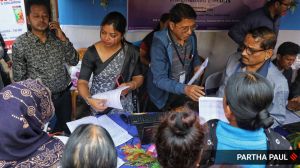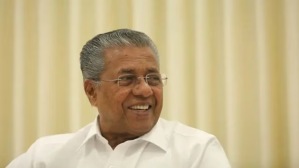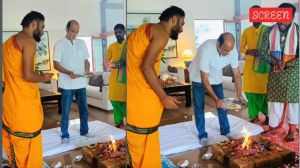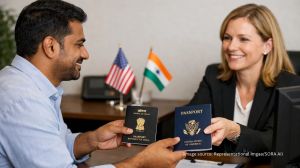History is never static — it is contested, rewritten and wielded as a weapon. Few understand this better than Janaki Bakhle, a historian at the University of California, Berkeley, whose work dissects the ideological battles shaping South Asia’s past and present. Her first book, Two Men and Music, explored how nationalism reshaped India’s classical music traditions. Now, in Savarkar and the Making of Hindutva, she takes on one of the most polarising figures in modern Indian history: Vinayak Damodar Savarkar. In this interview, Bakhle reflects on the challenges of writing about politically charged historical figures, the dangers of state-driven historical revisionism, and what Savarkar’s contested legacy reveals about India’s present. Edited excerpts:

Partly because I was interested in expanding the contours of Indian intellectual history and expanding it to include figures who were, shall we say, on the wrong side of the Gandhi-Nehru debate. The reason to do that is that, in the 1920s, 1930s and 1940s, there were a great many politicians involved in the conversation about what India was going to look like and how India was going to be free of the British, and Indian history. My field has tended to the nationalist. By that, I mean we focused on Gandhi and Nehru and we focused a lot on Ambedkar — which we should. But we haven’t paid the same attention to figures such as Madan Mohan Malviya, KM Munshi or Savarkar. They were part of that conversation. Even if you were disagreeing with them, as Gandhi and Nehru did, they still made up that conversation. So imagine writing a history of a conversation in which you exclude one of the people. I wanted to look at how a kind of everyday anti-Muslim prejudice could sit comfortably with social reform, caste reform and a kind of feminist politics. All of that comes together in Savarkar.
Savarkar’s clemency letters from the Andaman prison have been controversial in India. How do you interpret them?
They were strategic. You don’t change your politics on a dime. Savarkar was a politician at his core, deeply invested in India’s future. Sitting in the Andaman Islands, out of political relevance for 11 years, he would have written whatever was necessary to secure release — just as any other nationalist in his position might have. It’s unfortunate that this debate has been polemicised, about whether he was a nationalist or not, a toady or not, rather than being seen for what it was: a strategic move.
Your book highlights Savarkar’s criticism of Brahmanical orthodoxy. How do you reconcile this with his views on Muslims?
That contrast is precisely what I wanted to explore in my book. Savarkar is often studied in fragments — either as a poet, a political thinker or a social reformer — but in reality, all these aspects coexisted within him. His caste reformist stance sat alongside his deep-seated anti-Muslim prejudice, and together, they shaped the ideology of Hindutva that he championed. My goal was not to reconcile these contradictions but to present them as they were.
Story continues below this ad
Savarkar is often seen as the father of Hindutva. How do you assess his legacy in shaping modern Hindu nationalism?
I don’t follow contemporary discourse in a polemical sense but I do think Savarkar’s ideas have often been simplified. One of my aims in writing this book was to highlight that he was not just an anti-Muslim polemicist — he was also a social progressive, a poet and a historian. He was progressive on caste and gender issues. When one considers all of these aspects together, one sees other contradictory things — Gandhians who supported Savarkar and Ambedkarites who supported Savarkar because of his writings on caste.
Savarkar and Gandhi had starkly different visions for India. How do you compare their approaches, and what lessons can we draw from their disagreements in today’s polarised political climate?
Yes, they had starkly different visions. Gandhi was not a territorial nationalist; for him, nationalism was always about people. Savarkar’s nationalism, on the other hand, was territorial — it was about defining who belonged within its boundaries and under what conditions. As for today’s climate, I would say, bring back Gandhian nationalism.
Story continues below this ad
Your book focuses on Savarkar’s poetry and povadas rather than offering a traditional biography. Why did you choose this approach?
The poetry aspect was particularly important to me because, in Maharashtra, Savarkar is widely recognised as a poet. How do you write about somebody when their major output is poems and you ignore that? He is not just the author of Essentials of Hindutva; he is also the composer of Jayostute and other works known across Maharashtra. Ignoring his poetic output would be to overlook a significant dimension of his influence. More importantly, through my reading, I realised that poetry was not just a creative outlet for Savarkar — it was how he believed history should be written. And so it was through his poetry that I came to understand not just the affective hold of Hindutva, but why he was so venerated in Maharashtra and the mood in which he writes some very popular histories.
In India, the government has been accused of rewriting history textbooks and promoting particular historical narratives. How should historians respond?
We must resist it. No state should dictate what history should be taught. That responsibility belongs to historians. State-sponsored revisions to history that suit political needs should be opposed, and we must emphasise that redacted versions of history are not what should be taught in classrooms.
Story continues below this ad
How has social media impacted public understanding of South Asian history? How can historians address misinformation in this digital age?
We certainly are in a period where historians must contend with the fact that the usual academic spaces — university departments, for example — are no longer the only places where history is being discussed. Personally, I don’t engage on social media but I know colleagues who do. Leaving that space entirely to non-experts is probably not a good idea.
Do you think this is a particularly South Asian issue, or does the West also grapple with similar challenges?
No, I don’t think WhatsApp plays the same role in the West. From my limited understanding, this is more of a South Asian phenomenon. That said, people in the West do get their historical information from platforms such as Facebook and from journalistic works. There is a thriving public sphere where figures such as Walter Isaacson, who wrote a biography of Steve Jobs, and journalists who document historical events have influence.
Story continues below this ad
Your book Two Men and Music critiques the nationalist appropriation of Hindustani classical music. Do you think this critique applies to other cultural forms?
Similar trends can be seen in dance and other art forms. During the anti-colonial nationalist movement, reformers sought to craft a “national music” that was perceived as noble and pure. The repercussions of this were restrictive: when funding and recognition are tied to a fixed, traditional form, artistic innovation suffers. That said, Indian artists have done an extraordinary job in breaking free of these constraints.

































